![Guilty Crown: Series 1 - Part 2 [Blu-ray]](/pictures/1126252.jpg) Guilty Crown: Series 1 - Part 2 | Blu Ray | (28/04/2014)
from £26.98
| Saving you £8.01 (29.69%)
| RRP
Guilty Crown: Series 1 - Part 2 | Blu Ray | (28/04/2014)
from £26.98
| Saving you £8.01 (29.69%)
| RRP Shu's desperate quest to save Inori from the mysterious spectre known as Death sends him hurtling through a horrifying flashback. Glimpses of the boy he once was combine with fragments of painful memories to hint at the harrowing origins of the Apocalypse Virus. Meanwhile nefarious GHQ agents seek to incite chaos by turning the frightened band of young rebels against each other. Division in the ranks - and the shocking death of a dear friend - pushes Shu to the brink of madness exposing Inori and everyone he loves to an eerily familiar enemy. As the terrifying truth about the power of the King's Right Hand emerges Shu and his comrades must place their faith in one another - and fight for the future of their world! Contains episodes 12-22.
![Score 2 [1999]](/pictures/1003096.jpg) Score 2 | DVD | (23/09/2002)
from £N/A
| Saving you £N/A (N/A%)
| RRP
Score 2 | DVD | (23/09/2002)
from £N/A
| Saving you £N/A (N/A%)
| RRP A small group of violent criminals carry out a daring bank robbery and escape with million eventually hiding the loot on a construction site. Months later when one of their number is killed during a high-speed car chase the surviving members of the gang decide to recover the money. Returning to the hiding place they discover the site has now been turned into an amusement park at the same time coming to the realisation that the only one who knew where the money was hidden is now dead. Recruiting a number of other gangsters to help search for the cash the unlikely thieves find themselves involved in a traitorous maze of double-crossing and betrayal further complicated by the unwanted attention of two crooked cops who have taken a personal rather than professional interest in the case...
 Guilty Crown Series 1 Part 1 (Eps 01-11) Blu-ray | Blu Ray | (18/11/2013)
from £N/A
| Saving you £N/A (N/A%)
| RRP
Guilty Crown Series 1 Part 1 (Eps 01-11) Blu-ray | Blu Ray | (18/11/2013)
from £N/A
| Saving you £N/A (N/A%)
| RRP Shu's entire world was shattered after a meteorite crashed into Japan, unleashing the lethal Apocalypse Virus. The chaos and anarchy born of the outbreak cost Shu his family and reduced him to a timid, fearful shell of the boy he'd once been. His life took another unexpected turn after a chance encounter with the stunning pop star, Inori. This mysterious beauty introduced Shu to the King's Right Hand: a genetic mutation that allows him to reach into hearts of mortals and turn them into weapons. Shu finds himself caught in the crossfire between those who desperately seek his newfound strength. On one side lurks a clandestine government agency, and on the other, Inori and the spirited band of rebels known as Funeral Parlor. The choice is Shu's to make - and the world is his to change.
![Grave Of The Fireflies [1988]](/pictures/1041659.jpg) Grave Of The Fireflies | DVD | (23/08/2004)
from £N/A
| Saving you £N/A (N/A%)
| RRP
Grave Of The Fireflies | DVD | (23/08/2004)
from £N/A
| Saving you £N/A (N/A%)
| RRP In the aftermath of World War II bombing two orphaned children struggle to survive in the Japanese countryside. To Seita and his four-year old sister the helplessness and indifference of their countrymen is even more painful than the enemy raids. Through desperation hunger and grief these children's lives are as heartbreakingly fragile as their spirit and love is inspiring. 'Grave Of The Fireflies' is a tale of the true tragedy of war and innocence lost not only of the abandoned young but of an entire nation. Isao Takahata's rightly revered and thought-provoking anime was winner of a special award at the 1989 Blue Ribbon awards and the Adult's Jury award at the 1994 Chicago International Children's Film Festival.
![Red Angel [Blu-ray]](/pictures/1157394.jpg) Red Angel | Blu Ray | (17/01/2022)
from £16.39
| Saving you £N/A (N/A%)
| RRP
Red Angel | Blu Ray | (17/01/2022)
from £16.39
| Saving you £N/A (N/A%)
| RRP Directed by Yasuzo Masumura (Giants and Toys, Blind Beast), Red Angel takes an unflinching look at the horror and futility of war through the eyes of a dedicated and selfless young military nurse. When Sakura Nishi is dispatched in 1939 to a ramshackle field hospital in Tientsin, the frontline of Japan's war with China, she and her colleagues find themselves fighting a losing battle tending to the war-wounded and emotionally shellshocked soldiers while assisting head surgeon Dr Okabe conduct an unending series of amputations. As the Chinese troops close in, she finds herself increasingly drawn to Okabe who, impotent to stall the mounting piles of cadavers, has retreated into his own private hell of morphine addiction. Adapted from the novel by Yorichika Arima, Masumura's harrowing portrait of women and war is considered the finest of his collaborations with Ayako Wakao (A Wife Confesses, Irezumi) and features startling monochrome scope cinematography by Setsuo Kobayashi (Fires on the Plain, An Actor's Revenge). Special Features High Definition Blu-ray (1080p) presentation Original uncompressed Japanese mono audio Optional English subtitles Brand new audio commentary by Japanese cinema scholar David Desser Newly filmed introduction by Japanese cinema expert Tony Rayns Not All Angels Have Wings, a new visual essay by Jonathan Rosenbaum Original Trailer Image Gallery Reversible sleeve featuring original and newly commissioned artwork by Tony Stella FIRST PRESSING ONLY: Illustrated booklet featuring new writing by Irene González-López
![Guilty Crown: Series 1 - Part 2 [DVD]](/pictures/1126251.jpg) Guilty Crown: Series 1 - Part 2 | DVD | (28/04/2014)
from £22.19
| Saving you £2.80 (12.62%)
| RRP
Guilty Crown: Series 1 - Part 2 | DVD | (28/04/2014)
from £22.19
| Saving you £2.80 (12.62%)
| RRP Shu's desperate quest to save Inori from the mysterious spectre known as Death sends him hurtling through a horrifying flashback. Glimpses of the boy he once was combine with fragments of painful memories to hint at the harrowing origins of the Apocalypse Virus. Meanwhile nefarious GHQ agents seek to incite chaos by turning the frightened band of young rebels against each other. Division in the ranks - and the shocking death of a dear friend - pushes Shu to the brink of madness exposing Inori and everyone he loves to an eerily familiar enemy. As the terrifying truth about the power of the King's Right Hand emerges Shu and his comrades must place their faith in one another - and fight for the future of their world! Contains episodes 12-22.
![The Mysterians [1957]](/pictures/1042908.jpg) The Mysterians | DVD | (13/02/2006)
from £N/A
| Saving you £N/A (N/A%)
| RRP
The Mysterians | DVD | (13/02/2006)
from £N/A
| Saving you £N/A (N/A%)
| RRP Join mankind's most treacherous battle for survival! From the director of the original Kaiju classic Godzilla comes The Mysterians - available on DVD for the first time! After a Japanese town is totally destroyed the military arrive to investigate. They encounter a giant robot that is decimating everything in its path. A dome appears out of the ground and a group of scientists are invited to meet the alien Mysterians from the planet Mysteroid. The Mysterians have come in peace all they ask humanity for is three-square kilometers of land and the right to interbreed with Earth women to repopulate their species. Outraged at such a suggestion humanity declares war on the Mysterians which leads to the revelation of the aliens' sinister secrets. However Earth stands little chance against the technologically advanced beings unless a group of scientists can come up with a super weapon to use against them. The Mysterians was the first colour Japanese science fiction film to be shot in widescreen. The creative team responsible for Godzilla reunited for the production and the special effects are striking. Flying saucers zeppelin-type aircraft ray-gun blasts mass floods and violent explosions are fantastically executed setting the standard for model effects and science fiction art design for years to come. Vibrant and bursting with action The Mysterians is an arresting vision of futuristic warfare and a cautionary tale for the atomic age; a treat not only for robot fanatics and cult sci-fi film fans but one of Ishiro Honda's most celebrated and spectacular extravaganzas.
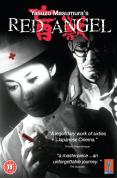 Red Angel | DVD | (24/07/2006)
from £9.98
| Saving you £10.01 (50.10%)
| RRP
Red Angel | DVD | (24/07/2006)
from £9.98
| Saving you £10.01 (50.10%)
| RRP One of Japan's most notorious and internationally criminally under-exposed films. Shocking beautiful and moving in equal measure this is one of Masumura's very finest achievements. Set against the Sino-Japanese war in 1939 a young angelic military nurse is raped by her patients and sent to the front line for daring to register a complaint. Posted to a rag-tag demoralised unit she falls in love with an impotent morphine-addicted surgeon. Together the pair seek solace in each othe
![Guilty Crown Series 1 Part 1 (Eps 01-11) [DVD]](/pictures/1124162.jpg) Guilty Crown Series 1 Part 1 (Eps 01-11) | DVD | (18/11/2013)
from £17.97
| Saving you £10.01 (66.82%)
| RRP
Guilty Crown Series 1 Part 1 (Eps 01-11) | DVD | (18/11/2013)
from £17.97
| Saving you £10.01 (66.82%)
| RRP Shu's entire world was shattered after a meteorite crashed into Japan unleashing the lethal Apocalypse Virus. The chaos and anarchy born of the outbreak cost Shu his family and reduced him to a timid fearful shell of the boy he'd once been. His life took another unexpected turn after a chance encounter with the stunning pop star Inori. This mysterious beauty introduced Shu to the King's Right Hand: a genetic mutation that allows him to reach into hearts of mortals and turn them into weapons. Shu finds himself caught in the crossfire between those who desperately seek his newfound strength. On one side lurks a clandestine government agency and on the other Inori and the spirited band of rebels known as Funeral Parlor. The choice is Shu's to make - and the world is his to change. Special Features: Commentary for Episodes 2 and 4 Guilty Crown 4-Panel Theater Into the Void: The Creative Vision Episode Previews Textless Opening Songs Textless Ending Songs U.S. Trailer Trailers
![An Actor's Revenge [1962]](/pictures/1002851.jpg) An Actor's Revenge | DVD | (27/01/2003)
from £14.98
| Saving you £5.01 (33.44%)
| RRP
An Actor's Revenge | DVD | (27/01/2003)
from £14.98
| Saving you £5.01 (33.44%)
| RRP This wildly melodramatic tale of a kabuki female impersonator who exacts a long-delayed revenge on the men who drove his parents to suicide is played out against a backdrop of comic rivalries between thieves in the Tokyo underworld. Kazuo Hasegawa plays the dual role of the actor and the thief in a film which celebrates his 300th screen appearance. A heady mixture of swooning romanticism and stylised action with a soundtrack that ranges from traditional Japanese music to lush Hollywo
![A tale of Samurai cooking: a true love story [DVD]](/pictures/1134851.jpg) A tale of Samurai cooking: a true love story | DVD | (27/04/2015)
from £8.75
| Saving you £4.24 (48.46%)
| RRP
A tale of Samurai cooking: a true love story | DVD | (27/04/2015)
from £8.75
| Saving you £4.24 (48.46%)
| RRP Haru has an excellent sense of taste and surpassing skill in the kitchen but she and her first husband got divorced after just one year of marriage because of her impetuous character. One day Dennai Funaki samurai chef from Kaga proposes that Haru should marry his son and heir. The Funaki family serves the Lords of Kaga not with the sword but with the kitchen-knife and have been renowned as “Kitchen Samurai” for generations. But Haru's new husband Yasunobu wields a kitchen-knife with no skill whatsoever. In order to save the Funaki family name and its position as kitchen samurai Haru decides to teach Yasunobu the art of cuisine. The story is inspired by a real-life family in Kaga which has survived countless upheavals with its cuisine.
![Princess From The Moon [1987]](/pictures/1005965.jpg) Princess From The Moon | DVD | (13/01/2003)
from £N/A
| Saving you £N/A (N/A%)
| RRP
Princess From The Moon | DVD | (13/01/2003)
from £N/A
| Saving you £N/A (N/A%)
| RRP Toshiro Mifune stars in this enchanting film based on the traditional Japanese fairytale 'Kaguya' as the male half of a country couple who find a baby girl in the bamboo and raise her as their own until the truth is revealed when she is taken back...
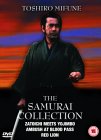 The Samurai Collection | DVD | (29/03/2004)
from £N/A
| Saving you £N/A (N/A%)
| RRP
The Samurai Collection | DVD | (29/03/2004)
from £N/A
| Saving you £N/A (N/A%)
| RRP Three features: 'Red Lion' 'Ambush At Blood Pass' and 'Zatoichi Meets Yojimbo'. Red Lion: With the winds of change sweeping through Japan overthrowing three centuries of Shogunate rule Gonzo (Toshiro Mifune) a peasant enlists in the Imperial Restoration Force which promises to reform the oppression of the past. Gonzo persuades his commander to lend him his Red Lion Mane a symbol of authority and rides into his old home town where he receives a hero's welcome. This tale both touching and hilarious traces the difficulties of a simple boastful humane man caught in the web of political intrigue. Casting a cold eye on politicians of all hues at its climax it achieves true tragic intensity. Ambush At Blood Pass: Yojimbo a ronin (Mifune) is secretly commissioned to travel to Sanshu Pass. This once crucial thoroughfare in the time of the warlords is now just a backroad used by outcasts. There he is to wait until an undisclosed event occurs. On his journey he rescues a woman from her violent husband and takes her away with him. They arrive at an inn run by an old man and his granddaughter. This place has become home to a bunch of misfits including a one-time physician (Katsu) a wandering gambler and an officer of the law together with his prisoner. A dramatic chain of events unfolds forcing the once hostile and untrusting characters to unite in a common cause: their own survival. Zatoichi Meets Yojimbo: The gentle breeze the murmur of a babbling brook the scent of plums. These memories call Zatoichi the blind swordsman back to a once-loved village. But memories are deceptive and he arrives to find things much changed. The former boss Hyoroku has been reduced to a carver of statues of Jizo the Buddha of Healing and his daughter Umeno has become a hostess and as she describes herself one of the bad ones. Control of the village is split between a former travelling merchant Eboshiya and his son Masagoro. Eboshiya befriends Zatoichi and seeks his aid against Masagoro's minder the drunken samurai Yojimbo the crooked crook. When a masseur is killed amidst rumours that a large amount of gold has been secreted in the village the two factions begin to size each other up. It is at this point that Masagoro's younger son suddenly decides his father needs more protection and calls on the services of the contract killer Kuzuryu.
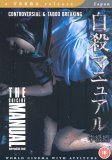 The Suicide Manual Intermediate Level | DVD | (27/11/2006)
from £21.58
| Saving you £-5.59 (N/A%)
| RRP
The Suicide Manual Intermediate Level | DVD | (27/11/2006)
from £21.58
| Saving you £-5.59 (N/A%)
| RRP Chilling horror based on Watari Tsurumi's non-fiction book ""Kanzen Jisatsu Manyual"" (The Complete Manual Of Suicide). There has been a surge in the number of people killing themselves; a mysterious DVD is found on the bodies of the victims. Nozomi falls under the spell of a deadly cult. Yousuke the policeman she is seeing soon realizes that the cult has something to do with the DVD. Then one day all trace of the group disappear - along with Nozomi.
![Humanity And Paper Balloons [1937]](/pictures/1010996.jpg) Humanity And Paper Balloons | DVD | (25/07/2005)
from £N/A
| Saving you £N/A (N/A%)
| RRP
Humanity And Paper Balloons | DVD | (25/07/2005)
from £N/A
| Saving you £N/A (N/A%)
| RRP Widely regarded as Yamanaka's greatest achievement Humanity and Paper Balloons [Ninjo kami fusen] was tragically his last film and only one of three that survive today. In a short six year 22 film career Yamanaka quickly earned a reputation for exceptionally fluid editing and a beautiful visual form likened to the paintings of Japanese masters. The story develops in the Tokugawa era of the 18th century in a poor district of Tokyo where impoverished samurai live from hand to
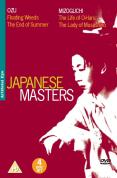 The Japanese Masters Collection | DVD | (09/10/2006)
from £N/A
| Saving you £N/A (N/A%)
| RRP
The Japanese Masters Collection | DVD | (09/10/2006)
from £N/A
| Saving you £N/A (N/A%)
| RRP Floating Weeds (Dir. Yasujiro Ozu 1959): Floating Weeds is one of the final films directed by the legendary Japanese filmmaker Yasujiro Ozu. A remake of one of his own silent features it tells the story of a travelling Kabuki acting troupe led by Komajuro who arrive in a small coastal town. There Komajuro is reunited with his former lover Oyoshi and their illegitimate son who is unaware that the itinerant actor is his father. But the reunion provokes the jealousy of Sumiko Komanjuro's current mistress who plots a devastating revenge. Beautifully composed and surperbly played 'Floating Weeds' is one of Ozu's most affecting poignant and powerful films. The End Of Summer (Dir. Yasujiro Ozu 1961): This penultimate film by Japanese master director Yasujiro Ozu examines the difficulties faced by the Kohayagawa family as they struggle to adapt their traditional values to a rapidly changing post-war Japan. As the family's generations-old sake making business begins to fail in the face of increasingly fierce competition Manbei the incorrigible elderly patriarch rekindles an affair with an old flame much to the disapproval of his daughter Fumiko. He is further distracted by his attempts to marry off his other two daughters: Akiko the eldest and a widow with a small son and Noriko the youngest who is still single. A sublime bittersweet elegy for a vanishing world The End of Summer is beautifully shot in muted colour elegantly acted and masterfully directed by one of the 20th Century's greatest filmmakers. The Lady of Musashino (Dir. Kenji Mizoguchi 1951): Mizoguchi's dissection of the Japanese reaction to the aftermath of war as a fastidiously moral woman faces upheaval with the changing times brought about by the new post-Imperial period... The Life of Oharu (Dir. Kenji Mizoguchi 1952): In feudal Japan the daughter of a samurai Oharu falls in love with a man below her station. Expelled from the castle in Kyoto her family tries to regain respectability but Oharu is forced into a new life as a concubine and then a fallen woman ever hoping to preserve some semblance of purity in a corrupt world...
 Tokyo Bullet Reloaded - Black Angel 2 / Score 2 / Gonin 2 Subtitled) | DVD | (27/09/2004)
from £18.39
| Saving you £6.60 (35.89%)
| RRP
Tokyo Bullet Reloaded - Black Angel 2 / Score 2 / Gonin 2 Subtitled) | DVD | (27/09/2004)
from £18.39
| Saving you £6.60 (35.89%)
| RRP Some of the finest examples of Japanese action cinema available in one box set. Features: The Black Angel 2: Takashi Ishii continues to explore the dark side of Tokyo in this sequel to Black Angel. This time Yuki Amami plays Mayu an assasin who becomes involved in a tangled web of friendship and revenge that can only end in despair. Ishii's direction makes for a dark gritty and intense move using violence as an expression of anguish. Gonin 2: Takashi Ishii's sequel
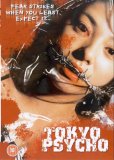 Tokyo Psycho | DVD | (22/08/2005)
from £N/A
| Saving you £N/A (N/A%)
| RRP
Tokyo Psycho | DVD | (22/08/2005)
from £N/A
| Saving you £N/A (N/A%)
| RRP Yumiko Osawa (Sachiko Kokubu) receives a strange letter from an anonymous sender. The letter reads 'I want to marry you' and 'you will be mine.' Though a little strange she passes off the event and moves on. Still single Yumiko's friend invites her to go to their high school reunion party to meet up with old friends. While at the party she receives a second letter this time with barbed wire and blood all over it. Despite her complaints the police does not do anything about it and it's up to Yumiko to find out who's behind the events. She starts to suspect that it's one of her former classmates and begins to find clues. But things take a deadly turn when the sender of the letters begin to stalk Yumiko and attempts to capture her...
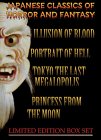 Japanese Classics Of Horror And Fantasy | DVD | (30/08/2004)
from £N/A
| Saving you £N/A (N/A%)
| RRP
Japanese Classics Of Horror And Fantasy | DVD | (30/08/2004)
from £N/A
| Saving you £N/A (N/A%)
| RRP A box set containing some of the best horror and fantasy films ever produced in Japan! Portrait Of Hell Created by premier Japanese novelist Ryunosuke Akutagawa (creator of Roshomon) 'Portrait of Hell' is a mesmerising look into humans creating hell on earth in their own unique ways. Must be seen to be believed! Illusion Of Blood From Shiro Toyoda director of the nightmarish 'Portrait Of Hell' comes a chilling story of love betrayal and vengeance. Tatsuya Nakadai stars as the selfish samurai Iyemon who after the loss of his lord has been left impoverished. He become outraged that his father-in-law intends to sell his two daughter's into prostitution. It is not love but respectability that Iyemon desires... Tokyo The Last Megalopolis When Masakado was executed for crimes against humanity over a thousand years ago his malevolent spirit refused to die with him merely becoming dormant and waiting for the chance to rise again. To disturb it is to awaken a terrible vengeance on the city of Tokyo. The demonic psychic Kato attempts to revive the slumbering evil and use its energy to plunge the city into a hell on Earth. It is up to a lone spiritual warrior Keiko a descendant of Masakado to stop the maniacal Kato before the spirit is released and the ancient curse is unleashed upon the world. Princess From The Moon Toshiro Mifune stars in this enchanting film based on the traditional Japanese fairytale 'Kaguya' as the male half of a country couple who find a baby girl in the bamboo and raise her as their own until the truth is revealed when she is taken back...
![What's Up Tiger Lily [1966]](/pictures/1078478.jpg) What's Up Tiger Lily | DVD | (07/01/2008)
from £10.80
| Saving you £2.19 (16.90%)
| RRP
What's Up Tiger Lily | DVD | (07/01/2008)
from £10.80
| Saving you £2.19 (16.90%)
| RRP In describing What's Up Tiger Lily? we thought it best left to Woody himself: 'We took a Japanese film made in Japan by Japanese actors and actresses and I took out all the soundtrack and knocked out all the voices and I wrote a comedy. The result is a movie where people are running around doing all those James Bondian things but what's coming out of their mouths is something wholly other. It was done before actually in Gone With The Wind but not many people know that. Those were Japanese people actually and we dubbed in American voices Southern voices. But that was years ago'. Woody Allen.

Please wait. Loading...
This site uses cookies.
More details in our privacy policy